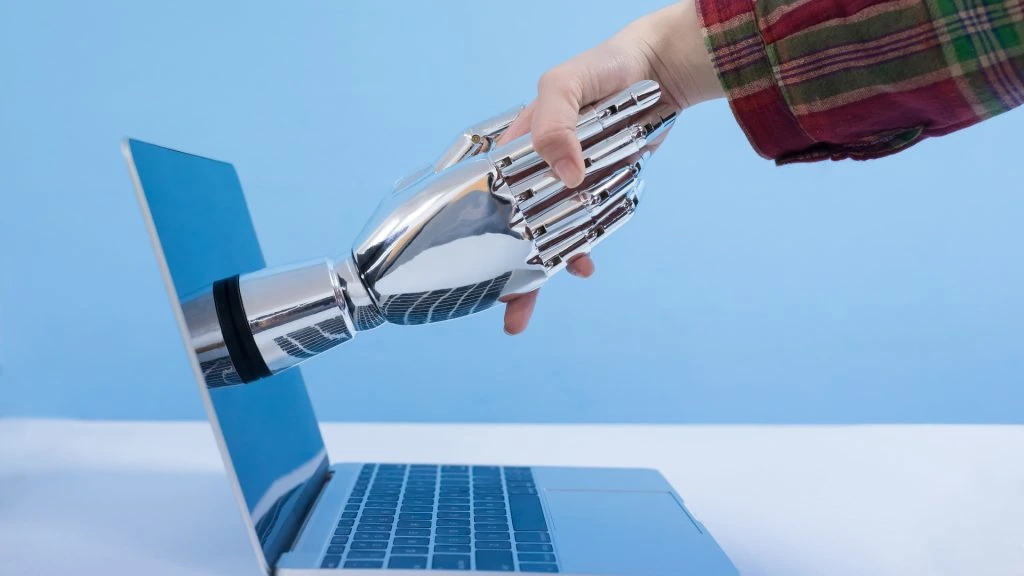In the modern working world, data and algorithms often have a sober reputation. They appear abstract and mechanical, far removed from the human dimension that plays a central role in personnel development.
However, the use of artificial intelligence (AI) is opening up new horizons and changing the way in which HR departments can support and develop their employees.
From theory to practice: the integration of AI in HR strategies
Although the benefits of AI are widely recognized, many companies are still faced with the question of how to use AI effectively. According to a survey, 77% of HR managers see AI as a support for managers and employees. However, only 44% of companies use AI as part of their HR development strategies. This discrepancy shows: There is a gap between theoretical potential and practical implementation.
The introduction of AI is relatively new territory for many companies. HR departments are faced with the task of not only mastering technological integration, but also preparing employees for the new way of working. This includes training employees, ensuring ethical use and preparing them for the role of AI in their day-to-day work. While IT teams are often responsible for the technical implementation, it is often up to the HR department to gain the trust of employees, provide training and ensure that the rollout goes smoothly. Thorough internal training and awareness-raising is therefore essential to ensure the successful integration of AI.
Individual learning paths redefined
One of the most exciting applications of AI in HR development is the ability to create personalized learning paths. AI technologies are able to process large amounts of data, recognize patterns and provide personalized insights. This enables the development of customized coaching plans that are tailored to the specific needs and learning styles of each individual employee.
By analysing performance data and learning behaviour, AI can create personalized learning materials – from tailored worksheets to personalized videos. This customized content helps to keep the learning process dynamic and tailored to the individual employee. The continuous adaptation of the materials ensures that the coaching process remains exciting and motivating.
In addition, AI enables predictive analytics that provide valuable insights into potential career paths. By analyzing historical data, AI can identify potential roadblocks and growth opportunities, allowing coaches to make targeted recommendations. This strategic information is critical to aligning individual career goals with long-term organizational goals. Real-time feedback through AI can also identify areas where employees are struggling and provide targeted support. This promotes a culture of continuous learning and improvement, enabling employees to achieve their goals more efficiently.
AI and human interaction in coaching
Although the benefits of AI in coaching are obvious, the technology poses challenges. One of the biggest challenges is finding the right balance between technological support and human interaction. Empathy, emotional intelligence and human connection are essential for a successful coaching relationship – aspects that AI can currently only replicate to a limited extent.
Human coaches use their intuition and emotional intelligence to recognize unspoken needs, respond to emotions and build trust. These human elements are critical to creating a supportive and effective coaching environment. While AI can help increase efficiency and provide data-driven insights, it should not be considered a complete replacement for human interaction.
Instead, AI can be a valuable tool that supports and complements human coaches. The majority of HR professionals recognize this, with only 2% believing that AI will replace human coaches in the next five years. The challenge is to integrate AI and human expertise in such a way that both bring their strengths to bear and achieve the best possible results.
Data protection and ethics
The use of AI in personnel development also raises important data protection and ethical issues. AI systems require large amounts of data for training and continuous learning. The protection of personal data is therefore of paramount importance. Companies must ensure that their training platforms comply with strict security standards such as ISO 27001 certification and GDPR requirements to ensure the protection of sensitive information.
Another ethical aspect is to handle data responsibly and avoid discrimination. AI systems must be fair and transparent so that all employees are treated equally and no undue prejudice or discrimination arises.
Companies that master this balance between AI and humanity can optimally support their employees and achieve their own goals at the same time. The future of HR development lies in the intelligent use of data and algorithms – for efficient, individual and human development that taps into the full potential of employees and drives the company’s goals forward.







